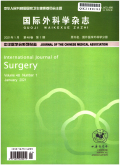低危分化型甲状腺癌术后促甲状腺素抑制治疗的研究进展
Summary of research progress on postoperative thyroid stimulating hormone suppression therapy of low-risk differentiated thyroid cancer
摘要目前临床上分化型甲状腺癌(DTC)的主要治疗手段是外科手术联合 131I治疗及促甲状腺激素(TSH)抑制治疗。DTC术后TSH抑制治疗对于高危人群初始TSH控制在<0.1 mU/L可明显降低肿瘤的复发率已成为临床沿用的观点,而对于低危人群过度的TSH抑制治疗则没有明显额外益处。目前临床上对于中低危人群的TSH最佳抑制程度、是否进行TSH抑制治疗以及TSH抑制治疗的合理时机仍存在争议,且术后长期的TSH抑制治疗也会带来许多副作用,因此本文将对低危DTC人群术后TSH抑制治疗方面,包括合理地应用药物、调整药物剂量以及制定个体化的TSH抑制治疗方案等进行综述。
更多相关知识
abstractsAt present, the main treatment for differentiated thyroid carcinoma (DTC) in clinical practice is surgery combined with 131I therapy and TSH suppression therapy. The view that TSH suppression therapy after DTC surgery can significantly reduce the recurrence rate of tumors by initially controlling TSH in high-risk patients below 0.1 mU/L has become a widely accepted clinical practice. However, there is no significant additional benefit from excessive TSH suppression in low-risk patients. Currently, there is still controversy in clinical practice regarding the optimal degree of TSH suppression, whether to perform TSH suppression therapy, and the appropriate timing for TSH suppression therapy in middle-low-risk patients. Moreover, long-term TSH suppression therapy after surgery also brings many side effects. Therefore, this review will summarize the rational use of drugs, adjustment of drug dosage, and individualized TSH suppression therapy plan for low-risk DTC patients after surgery.
More相关知识
- 浏览9
- 被引0
- 下载2


相似文献
- 中文期刊
- 外文期刊
- 学位论文
- 会议论文



 换一批
换一批 换一批
换一批



